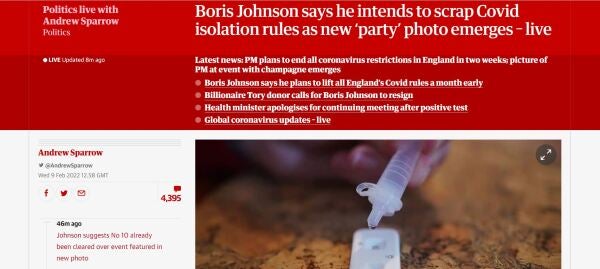
The pandemic has attached “rocket boosters” to news live blogs and led to more investment from publishers as sites try to more closely mirror the experience of social media scrolling.
The BBC told Press Gazette that interest in Downing Street press conferences and Covid case rates had helped make their live pages become “appointment viewing”, with its live pages collectively seeing more than one billion visits during 2021.
At The Guardian, the Politics Live Blog with Andrew Sparrow celebrated its 2,500th instalment on 27 January and has amassed more than one billion page views in its lifetime. It has already seen more than one million page views on ten of its blogs since the start of 2022.
Press Gazette can reveal that as a result of its success the BBC is launching a new live team with 31 journalists, led by new live editor Kevin Ponniah and supported by significant investment, as it looks to expand its live page coverage beyond the pandemic with new topics, formats and use of video. The team consists of journalists already part of the BBC’s digital news unit.
The pages are increasingly becoming a vital and more “digital native” pillar of the BBC’s news coverage, Ponniah told Press Gazette.
Executive online news editor Stuart Millar (pictured, left) added that the BBC was an early pioneer of the live format almost 20 years ago, and other major outlets like the New York Times are only just catching up.
Millar said: “Live blogs everywhere have rocket boosters right now thanks to the pandemic… the BBC became appointment viewing for audiences, who expected us to have the latest accurate information that’s useful to them.”
The BBC’s live US election coverage across one week in 2020 saw 200 million page views alone, while more than one million readers were on the page at once when Boris Johnson announced the closure of schools in March 2020.
‘It’s a truly digitally native way of storytelling’
Of the investment in a new live team, Millar added: “There’s been a massive restructuring at BBC News. And in the process of doing that, we wanted to put live news as a specific team… Previously, it was just done by the digital news team and it would depend on who was available on any given day. We want to make this a much more systematic, deliberate part of operations.”
Of the 31 new roles for the live team, Millar said they would include editors and video teams “fed by hundreds, if not thousands, of BBC journalists”.
“On the big stories, we’ve got correspondents on the ground in most places around the world, and… expert opinion, whether it’s Laura Kuenssberg, or Faisal Islam or Jon Sopel,” he said.

The BBC also highlighted how its live coverage had changed over the years, with the first live pages from the 2003 Iraq War largely comprising a list of clunkily compiled reports from correspondents on the ground. This has now evolved into constantly updated pages with insights from social media, video and more.
Comparing that initial BBC offering to what is currently done by the New York Times, Millar said: “The New York Times has made big investments in live coverage, and they’ve got correspondent dispatches with updates. They look prettier, and the container is nicer, but it’s the same principle, really [that we did 20 years ago]. It’s trusted correspondents giving a picture for you of what they know.
“The BBC has been doing this for nearly 20 years, which I think makes us the earliest of early adopters of live journalism.”
New live editor Ponniah added: “It’s a truly digitally native way of storytelling and I think for younger users, scrolling on phones and trying to keep across those big things, it is a really natural way of reporting… I think it’s a really transparent way of reporting as we’re able to show our workings because we find out things at the same time as the audience.”
He added: “People come to us in those big moments because they know that they’re going to get something that they can rely on. That’s why we’re not really in competition with things like Twitter.”
‘You have to change the way you tell the story’
The Guardian has also seen repeated success with its live reporting during the pandemic. Andrew Sparrow (pictured, right), who has run The Guardian’s Politics Live blog for more than a decade, told Press Gazette: “In 2010, I remember a good day was if you’ve got 50,000 hits or page impressions.
“Since 2016, the lifetime daily average readership for a blog has been 460,000. That’s an enormous increase. But now we are quite regularly getting blogs that get more than a million page impressions a day.”

On why live blogs were so important for The Guardian’s online offering, he said: “If you watch television news from the 1950s and 1960s, basically what it was was radio news, being read out on screen.
“A lot of websites basically read like newspapers, and journalists were writing stories as we were writing them for newspapers and putting them online.”
He added: “Now people have started getting their news in real time electronically then you have to change the way you tell the story itself.”
Sparrow highlighted the Guardian’s bespoke blogging tools as a key reason they have been able to succeed, but explained that they were also extremely strange to develop at first.
“The developers spent a lot of mornings watching me with a clipboard. And then, another day, Graeme Wearden who does the business live blog and myself were asked to spend a day in a room behind a two-way mirror where the developers were just going to watch us, to see what we did,” he said.
Sparrow explained what had kept him interested in live blogging after being at the helm of the Guardian’s live politics blog for over a decade.
“I feel that I have more freedom than I do writing for normal digital news,” he said. “For normal news, on any given day you can pick up interesting things from half a dozen stories. But I would go home happy if I got a chance to write that one story up but sad about the ones I missed.
“So in that sense, I find it enjoyable and find it hard to understand why every journalist doesn’t have one.”
Pictures: Buzzfeed and The Guardian
Email pged@pressgazette.co.uk to point out mistakes, provide story tips or send in a letter for publication on our "Letters Page" blog
